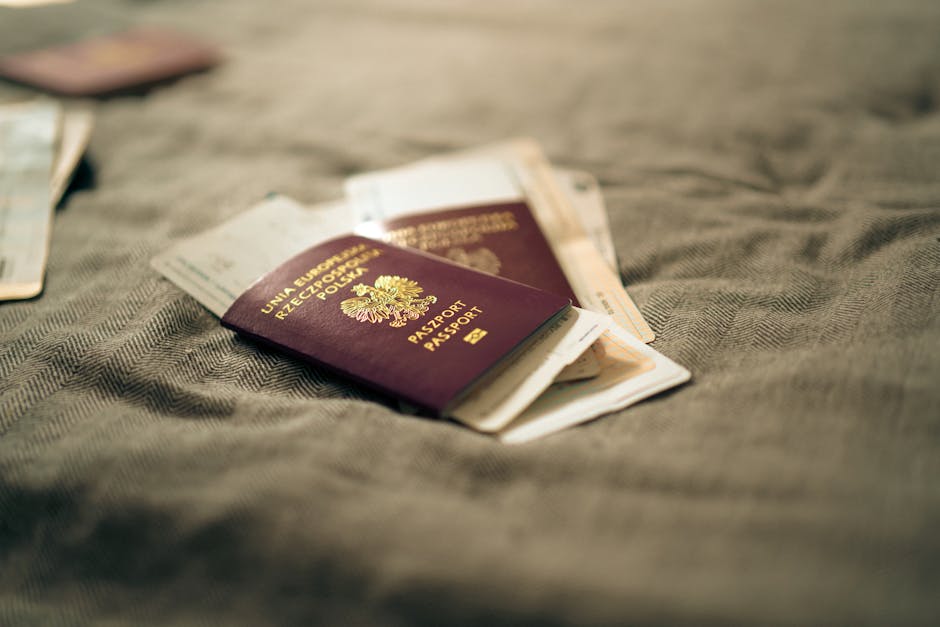Thailand Visa Requirements: Your Stress-Free Guide to Paradise

Thailand Visa Requirements: Your Stress-Free Guide to Paradise
Hey there, fellow travel enthusiast! So, you're dreaming of golden temples, vibrant markets, and pristine beaches, eh? Thailand is calling your name! But before you pack your bags and book that flight, let's talk about something that can easily turn that dream into a bit of a nightmare: visa requirements. Trust me, I've seen it happen. Nothing spoils a trip faster than being turned away at immigration! So, let's break down everything you need to know about getting your Thai visa sorted, ensuring your trip to the Land of Smiles is smooth sailing from start to finish. I'll share my own experiences and tips to help you navigate the process with ease.
Do You Even Need a Visa? The Visa Exemption Lowdown

First things first: do you actually need a visa? For many nationalities, the answer is surprisingly no. Thailand offers a visa exemption program, allowing tourists from a long list of countries to enter for a certain period without a visa. Think of it as a free trial of Thai paradise!
Who benefits from this? The most common visa exemption is the 30-day visa exemption, granted upon arrival at most international airports and land borders. This applies to citizens of many Western countries, including:
- United States
- Canada
- United Kingdom
- Australia
- Most European Union countries
- New Zealand
Important caveat: These exemptions are often extendable. However, you'll need to visit an immigration office and pay a fee. Don't overstay your welcome without extending, or you could face fines, detention, and even a ban from re-entering Thailand. Trust me, it's not worth the hassle!
Staying longer? There's also a 45-day visa exemption that's often (but not always!) offered. This is usually introduced during peak tourist seasons or to encourage tourism after events like the pandemic. Keep an eye on the Tourism Authority of Thailand (TAT) website for the latest updates. They're the official source, and I always double-check with them before finalizing my plans.
Double-check your nationality! The list of eligible countries and the duration of the exemption can change, so it's absolutely vital to verify the latest information on the website of the Royal Thai Embassy or Consulate in your country. Seriously, do it. Don't rely on outdated information from travel forums. I once saw a couple get turned away because they based their trip on old data - talk about a holiday buzzkill!
Tourist Visa (TR): For Those Longer Stays

Okay, so the visa exemption doesn't cut it for you? Maybe you're planning an extended backpacking trip, want to delve deeper into Thai culture, or simply want to soak up the sun for a few months. In that case, you'll need a Tourist Visa, often referred to as a TR visa.
What is it? A TR visa allows you to stay in Thailand for a longer period than the visa exemption permits. Generally, you can apply for a single-entry TR visa, which is valid for 60 days, and often extendable once for an additional 30 days at an immigration office in Thailand. This gives you a potential total stay of 90 days.
How to apply: The application process usually involves the following:
- Application form: Download it from the Royal Thai Embassy or Consulate website in your country. Fill it out carefully and accurately.
- Passport: Your passport must be valid for at least six months beyond your intended stay in Thailand. This is a non-negotiable requirement! Make sure you have enough blank pages for visa stamps.
- Passport photos: You'll typically need recent passport-sized photos that meet specific requirements (size, background color, etc.). Check the embassy website for the exact specifications.
- Flight confirmation: You'll need to provide proof of your round-trip ticket or onward travel. This shows you intend to leave Thailand before your visa expires.
- Proof of funds: The embassy may require you to demonstrate that you have sufficient funds to support yourself during your stay. This could be in the form of bank statements or a letter from your bank.
- Visa fee: There's a fee associated with the visa application, which varies depending on your nationality and the embassy.
My tip: Apply well in advance of your trip, as processing times can vary. It's better to be safe than sorry! Also, make sure you have all the required documents and that they are properly organized. A well-prepared application shows you're serious and can speed up the process.
Non-Immigrant Visa: Beyond Tourism

If you're planning to work, study, or retire in Thailand, you'll need a non-immigrant visa. These visas are designed for specific purposes and come with their own set of requirements.
Common types of non-immigrant visas:
- Non-Immigrant B Visa (Business/Work): This visa is for individuals who intend to work in Thailand. It requires a work permit issued by the Thai Ministry of Labour.
- Non-Immigrant ED Visa (Education): If you're planning to study at a recognized educational institution in Thailand, you'll need an ED visa.
- Non-Immigrant O Visa (Other): This visa covers various situations, including retirement (for those over 50 with sufficient financial resources), marriage to a Thai national, or being a dependent of someone with a valid work permit.
- Non-Immigrant OA Visa (Long Stay): This is specifically for retirees who meet certain financial criteria, including having a monthly income or funds in a Thai bank account.
Application process: The application process for a non-immigrant visa is generally more complex than for a tourist visa. You'll need to provide documentation specific to your purpose of stay, such as employment contracts, school acceptance letters, or proof of marriage.
Important Note: Don't try to work on a tourist visa or overstay your visa. This is illegal and can have serious consequences. It's always best to follow the rules and obtain the appropriate visa for your intended activities.
Visa Runs: A Thing of the Past?

Ah, visa runs! Remember those days? For years, many expats and long-term travelers would hop across the border to a neighboring country (like Laos, Cambodia, or Malaysia) to renew their visa exemption. It was a common practice, but things have changed.
The crackdown: Thai immigration authorities have become much stricter on visa runs in recent years. Frequent border crossings to repeatedly obtain visa exemptions can raise red flags and may result in being denied entry. They're looking for people who are essentially living in Thailand without the proper visa.
My advice: Don't rely on visa runs as a long-term solution. If you plan to stay in Thailand for an extended period, it's best to obtain the appropriate visa that aligns with your activities. It's more ethical, legal, and less stressful in the long run.
Extending Your Visa: Staying a Little Longer

So, you're having an amazing time in Thailand and want to extend your stay? Good news! It's often possible to extend your tourist visa or visa exemption at an immigration office in Thailand.
Where to go: Major cities like Bangkok, Chiang Mai, and Phuket have immigration offices where you can apply for an extension. It's best to visit the office in the area where you're staying.
What you'll need:
- Passport: With your current visa stamp or entry stamp.
- Extension application form: Obtainable at the immigration office.
- Passport photo: Again, recent photos that meet the specified requirements.
- Fee: There's a fee for extending your visa, which varies depending on the type of visa and the duration of the extension.
- Copy of your passport's bio page, visa page (if applicable), and entry stamp. Always bring copies - it saves time.
- Sometimes proof of address in Thailand. This could be a hotel booking or a copy of a lease agreement.
My tip: Go early! Immigration offices can get crowded, and you want to avoid long lines. Also, dress appropriately (no shorts or sleeveless shirts) and be polite to the immigration officers. A little respect goes a long way.
Overstaying Your Visa: A Big No-No!

This is where things can get really messy. Overstaying your visa in Thailand is a serious offense that can lead to fines, detention, deportation, and even a ban from re-entering the country. Don't do it! I can't stress this enough.
The consequences:
- Fines: You'll be fined for each day you overstay, with the amount increasing over time.
- Detention: You may be detained by immigration authorities until your deportation arrangements are made.
- Deportation: You'll be deported back to your home country at your own expense.
- Banning: You may be banned from re-entering Thailand for a specified period, or even permanently, depending on the length of your overstay.
What to do if you accidentally overstay: If you realize you've overstayed your visa, don't panic. Go to the nearest immigration office as soon as possible and explain your situation. Be honest and cooperative, and they may be more lenient. You'll likely have to pay a fine, but it's better than facing more severe consequences.
Online Visa Applications: The Future is Now?

While Thailand is making strides in digitalizing its visa processes, online visa applications are not yet widely available for all nationalities and visa types. However, there are some developments to keep an eye on.
e-Visa: The Thai government has been piloting an e-Visa program for certain nationalities, allowing applicants to submit their applications and supporting documents online. This streamlines the process and reduces the need to visit an embassy or consulate in person.
Check the official website: The best way to stay informed about online visa options is to regularly check the website of the Royal Thai Embassy or Consulate in your country. They'll have the most up-to-date information on available e-Visa programs and application procedures.
Essential Tips for a Smooth Visa Experience

Okay, we've covered a lot of ground. Here are some final tips to ensure your Thai visa experience is as smooth as possible:
- Start early: Don't wait until the last minute to apply for your visa. Give yourself plenty of time to gather the necessary documents and complete the application process.
- Check the requirements carefully: Pay close attention to the specific requirements for your visa type and nationality. Make sure you have all the required documents and that they meet the specified criteria.
- Be organized: Keep all your visa-related documents in a safe and organized place. This will make it easier to find them when you need them.
- Be honest: Be truthful on your visa application and during any interviews with immigration officials. Providing false information can lead to serious consequences.
- Be respectful: Treat immigration officers with respect and courtesy. They're just doing their job.
- Keep up to date: Regulations change so regularly, checking the Thai Embassy website in your country of origin is a must.
So there you have it! Everything you need to know about Thai visa requirements to ensure your trip is filled with unforgettable memories, and not immigration headaches. Remember, a little planning goes a long way. Now go ahead, book that flight, and get ready to experience the magic of Thailand! Safe travels!
Post a Comment